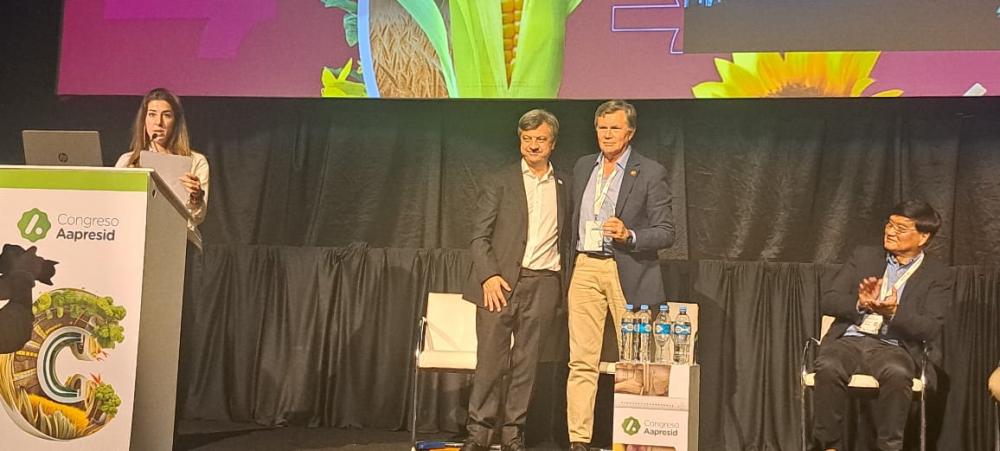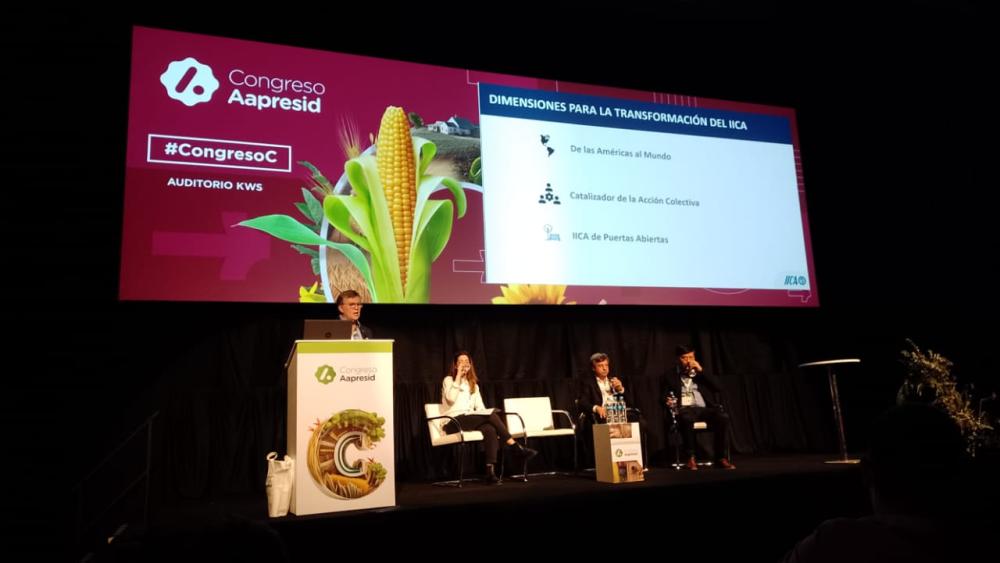Argentine producers focused on innovation presented an award to the Director General of IICA, Manuel Otero, for his contribution to the development of sustainable agriculture in the hemisphere

ROSARIO, Argentina, 10 August 2023 (IICA) - The Argentine Association of No-Till Farmers (AAPRESID), one of the most influential farmer networks in Latin America focused on soil conservation and innovation, honored the Director General of the Inter-American Institute for Cooperation on Agriculture (IICA), Manuel Otero, for his contribution to the development of sustainable agriculture in the Americas.
The award was presented by the president of AAPRESID, Marcelo Torres, during the entity's annual congress that takes place over three days in the Argentine city of Rosario. The event –focused on the idea that living and healthy soils contribute to the mitigation and adaptation to climate change- features the massive participation of producers, political decision-makers, experts, and academic leaders in the sector.
Torres underscored the importance of the work carried out by Mr. Otero and IICA, especially in favor of the articulation of the public and private sectors in the Americas and in the promotion of science, technology and innovation as key elements for the transformation of the agri-food systems of the region.
The president of AAPRESID, who has also just been appointed as the head of the Confederation of American Associations for Sustainable Agriculture (CAAPAS), a group of entities focusing on sustainability from all over the hemisphere, commended IICA for consolidating a regional bloc that defends the role of food production as the driving force behind the economic and social development of countries.
"IICA does a great job of making the world aware of the collaborative innovation process that exists in agriculture in the region and aligning the countries of the region in defense of common interests," said the president of AAPRESID.
AAPRESID is an international reference association in terms of agricultural sustainability, since it brings together producers who have adopted a new paradigm for many years, based on no-till farming, soil cover and crop rotation, which seeks to increase productivity without the negative impact of farming, thus responding to the global demand for greater food production with less environmental impact.
During the award ceremony, Torres mentioned that Otero's leadership came into the spotlight when IICA coordinated the discussions that led to a consensus on 16 key messages that the countries of the hemisphere presented at the 2021 United Nations Food Systems Summit. These messages focused on the irreplaceable role of agriculture, which is part of the solution to climate change, and on the role of farmers as guardians of global food security.
Torres also referred to the decision to install a pavilion -the Home of Sustainable Agriculture in the Americas- at the last United Nations Conference on Climate Change (COP 27), in Egypt. In this space, within the framework of the most important environmental negotiation forum in the world, representatives of the agricultural sector drew attention to the progress made in food production in the hemisphere in favor of the conservation of natural resources.
IICA will once again set up a pavilion at COP 28, which will take place starting on 30 November in Dubai. AAPRESID is one of the private sector organizations that has confirmed its presence, as it already did at the COP 27 in 2022.
Otero expressed gratitude for the award and underscored the fact that this was not a recognition of him individually, but rather of IICA, which for 80 years has worked at the service of agriculture and farmers in the Americas, to promote their development and sustainability while adapting to the different challenges of each era.
CAAPAS and IICA come together for sustainable agriculture
At the AAPRESID Congress, Torres and Otero shared a panel with Jonadan Ma, outgoing president of CAAPAS, to discuss the role of Latin American cooperation for sustainable agriculture. AAPRESID is an excellent opportunity to showcase the latest innovations applied to agriculture in Argentina and other countries of the region.
In the debate, which was followed by a large audience, the speakers underscored the importance of consolidating and building alliances to face the challenges of agri-food systems, creating networks spearheaded by producers, and placing science and technology at the center. Mailen Saluzzio, AAPRESID International Program Manager, was the moderator.
“Our job is to foster an increasingly sustainable production. The end goal is to increase carbon sequestration in the soil, in order to mitigate climate change and promote a better quality of life for societies. This is what we want,” said Ma, a Brazilian agronomist and farmer.
At the event, Torres, Ma and Otero signed a technical cooperation framework agreement on behalf of CAAPAS and IICA, where the two institutions agreed to work together to improve the competitiveness of the agri-food sector in the hemisphere through sustainable and regenerative agriculture, no-till farming, soil conservation, and practices that contribute to increasing yields while improving the quality of life of the rural inhabitants.
“This alliance between CAAPAS and IICA is a first step, and the result of a number of work meetings. Now it is time to do the joint work, with a roadmap and specific objectives; this constitutes a huge challenge," said Torres.

“We have high hopes in this alliance. Some of our challenges include measuring carbon sequestration in soils and the water footprint of agriculture, and the possibility of obtaining certifications. We do not have more arable land to scale production. That is why we must improve yields by bringing together producers, scientific systems, and political decision-makers”, he added.
Otero, for his part, pointed out that alliances between institutions are necessary to generate results for the benefit of farmers and our societies.
“This alliance must have real impact. There is much to be done in the region: we must strengthen research work; increase our international presence; communicate better; and be more proactive in telling the world what we are doing here to foster sustainable agriculture. This is a just and dignified struggle”, he explained.
“IICA,” he concluded, “seeks to be one step ahead and articulate the different countries and sectors, acting as a catalyst for collective action, and as an institution that looks at the world from the Americas. I am convinced that the future looks bright for our continent, because the world needs us as providers of food and guarantors of environmental sustainability. The Sustainable Development Goals (SDGs) will only be achieved with an American continent that stands strong, and with a robust agriculture”.
More information:
Institutional Communication Division.
comunicacion.institucional@iica.int